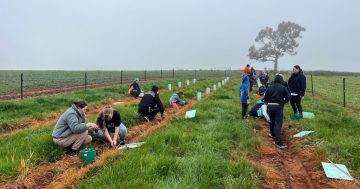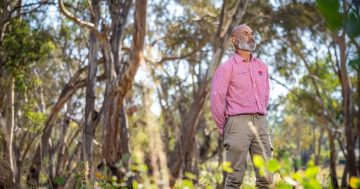
Wagga Wagga City Council Environmental Officer Sam Pascall visits the habitat of some of Wagga’s arboreal mammals. Photo: Wagga Wagga City Council.
Wagga Wagga City Council has released a draft plan to support threatened arboreal mammal species in the local government area.
The draft plan aims to protect, enhance, and increase targeted arboreal habitats and in turn, raise the numbers of the targeted species.
The species include the koala, squirrel glider, grey-headed flying fox and six species of microbats.
Council is encouraging locals to give their feedback on the plans following the draft entering public exhibition on 22 August.
The management plan will be on display for 22 days before a final plan is made.
Wagga Wagga City Council Strategic Sustainability Advisor Carly Hood said the 10-year planning document was identified as an action from council’s Biodiversity Strategy: Maldhangilanha 2020-2030.
“Since European settlement in the 1830s, more than 90 per cent of local native vegetation cover has been cleared for agriculture and urban development, resulting in the loss of habitat for a number of native species,” Ms Hood said.
“In turn, this has impacted fauna populations causing certain species to become classified as threatened through state and Commonwealth legislation.
“The draft Arboreal Mammal Management Plan focuses on our tree-dwelling species, which generally uses trees to forage, sleep and move throughout the landscape.”
The draft plan focuses on three key requirements to help preserve the habitats of the nine species of mammals, including the maintenance and preservation of hollowed-out trees, the connection of habitats, and the preservation of the existing foraging habitats.
“Protecting threatened species is the responsibility of all levels of government and the community,” Ms Hood said.
“The plan details objectives and actions outlining how council, in partnership with government agencies and community groups, will address the issues impacting these arboreal mammals.
“The five main objectives cover educating and inspiring the community, increasing data gathering and sharing, managing pest and weed species, enhancing the quality of existing habitat and increasing the extent of habitat and populations.
“Our main role will be to manage our own land effectively, but we will also play a role in promoting government programs to the community and key landholders.”
The Draft Arboreal Mammal Management Plan will be on public exhibition until Thursday 7 September 2023, with the public invited to make submissions during that period.











